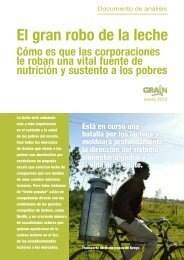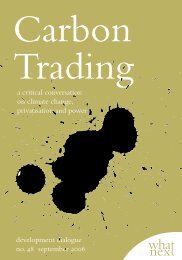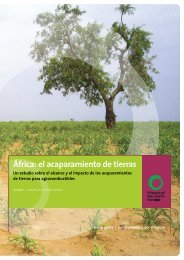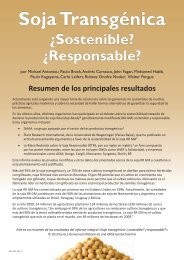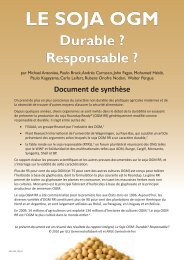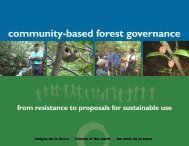Plantations, poverty and power - Critical Information Collective
Plantations, poverty and power - Critical Information Collective
Plantations, poverty and power - Critical Information Collective
You also want an ePaper? Increase the reach of your titles
YUMPU automatically turns print PDFs into web optimized ePapers that Google loves.
151<br />
paper industry along ecological lines. She concludes that a complete restructuring is the only way that the<br />
industry can begin to address the environmental problems that it has created. 701<br />
With this sort of alternative structure of the pulp <strong>and</strong> paper industry in mind, the following list is a<br />
suggestion for how paper should be produced. It is not intended to be a set of guidelines for investing in a<br />
“sustainable” pulp <strong>and</strong> paper industry. Instead it is intended to be a way of alerting both the industry <strong>and</strong><br />
its financiers to the problems currently created by the industry.<br />
Paper should be produced:<br />
•without destroying native forests;<br />
•without establishing large scale monoculture tree plantations;<br />
•without impacting on local peoples’ rights <strong>and</strong> access to l<strong>and</strong> <strong>and</strong> livelihoods;<br />
•without resulting in extensive environmental impacts: depletion of water resources, biodiversity loss,<br />
introduction of invasive species;<br />
•without polluting air, water <strong>and</strong> soils; <strong>and</strong><br />
•without benefiting from government direct or indirect subsidies (including ECAs, multilateral banks, or<br />
bilateral aid).<br />
Any pulp mill project that cannot meet these guidelines should not be funded <strong>and</strong> should not be built.<br />
This may seem impossible to achieve, or hopelessly idealistic. But there is no such thing as “responsible<br />
investment” in the pulp <strong>and</strong> paper industry, as it currently exists. Why should the industry be allowed to<br />
continue establishing vast areas of monoculture tree plantations in the South Why should the industry be<br />
allowed to “restructure” by sacking thous<strong>and</strong>s of workers in the North while it employs cheaper labour in<br />
dangerous <strong>and</strong> often temporary jobs in the global South Why should the industry continue to exp<strong>and</strong>,<br />
continue to promote wasteful consumption <strong>and</strong> continue to produce huge amounts of greenhouse gases<br />
Why should the pulp <strong>and</strong> paper industry be allowed to continue destroying local communities’ <strong>and</strong><br />
Indigenous Peoples’ livelihoods <strong>and</strong> environments<br />
Currently, development “aid” is one of the factors that helps to support the industry to continue business<br />
as usual, rather than looking for innovative solutions to the problems that it is creating. For this reason,<br />
this report dem<strong>and</strong>s an end to “aid” to industrial tree plantations. It also dem<strong>and</strong>s an end to “aid” to the<br />
pulp <strong>and</strong> paper industry, for the simple reason that aid is supposed to promote development which is<br />
beneficial to communities in the South. Industrial tree plantations <strong>and</strong> the pulp <strong>and</strong> paper industry are not<br />
beneficial to communities in the South.<br />
701 Maureen Smith (1997) “The U.S. Paper Industry <strong>and</strong> Sustainable Production: An Argument for Restructuring”, MIT<br />
Press.



